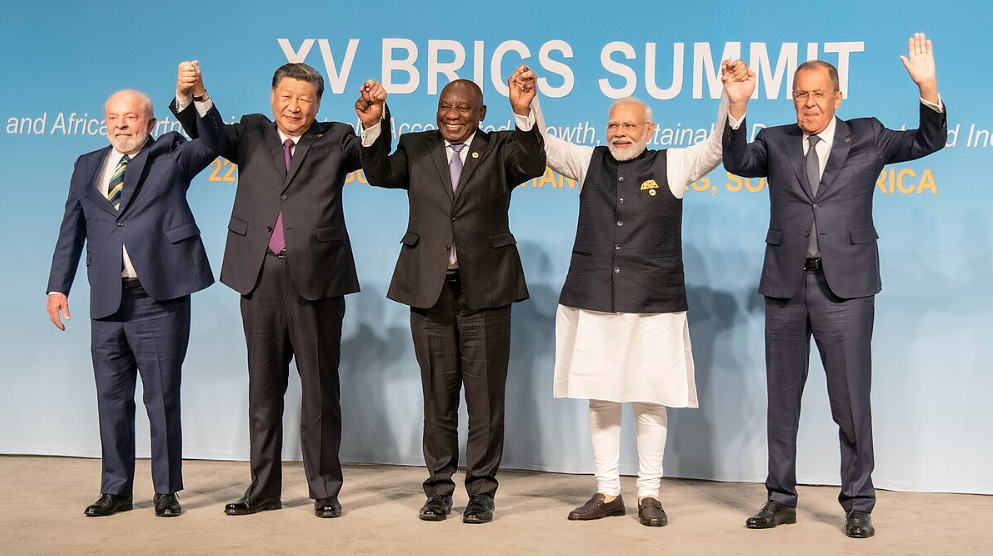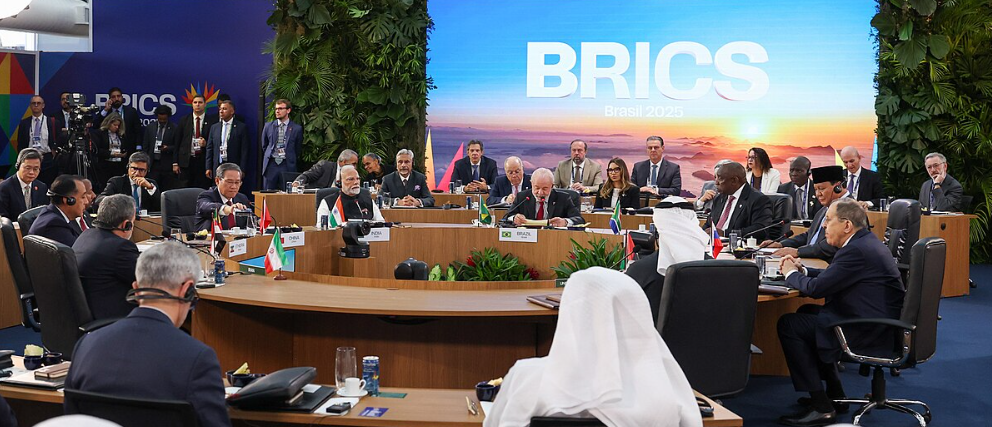BRICS Summit Takeaways: Iran, Gaza, and More

By: Ramsey Zeidan / Arab America Contributing Writer
In the modern age, the Global South and the Middle East are rising to the top of the global stage. Aiming to challenge Western hegemony, the new BRICS bloc has emerged, claiming to channel the voices of the Global South. BRICS consists of Brazil, Russia, India, China and South Africa, though expansions include nations like Nigeria and Indonesia. The 17th annual intergovernmental BRICS summit took place in Rio de Janeiro this past weekend. From rare earth mineral supply chains to counter-terrorism measures, the summit has brought a plethora of issues to the forefront. So, what does this mean for the Arab world?
BRICS and the Gulf Rift
As of 2024, Egypt, Saudi Arabia, and the United Arab Emirates are part of the expanded BRICS alliance. This is crucial because the summit discussed Artificial Intelligence, where the Gulf States have massive potential. The United States has already positioned itself to be a potent tech trading partner with the Gulf States. A controversy-ridden business tour around the Gulf helped President Trump strike deals to create data centers and broaden AI capacity building with key players. The UAE and Saudi Arabia are the biggest winners, walking away with millions of NVIDIA chips and a secure future. However, several countries in BRICS have expressed concern over AI. India’s Prime Minister Narendra Modi called for global AI ethics standards, with many in agreement. Smaller nations, particularly those without the resources to fight in the AI race, fear AI’s potency for coercion and domination.
The biggest problem that the BRICS bloc needs to address in the AI realm is supply chain dependency. Critical minerals needed for computer chips and AI development are sourced almost solely from China. India, Turkey and the Gulf States made a point to step away from this, embracing a multifaceted solution. The proposed solution is multipolarity, the idea that several global superpowers/blocs should exist simultaneously. BRICS’ end goal is a multipolar global stage, where overreliance on the U.S. or China isn’t necessary. If BRICS countries seek to compete with America, it must secure its supply chains and eliminate resource dependencies.
While the likes of India, Turkey and Nigeria are wary of Western dominance in AI, their fellow bloc members in the Gulf continue to collaborate with America. To make matters worse, President Trump also threatened BRICS members with a slew of heavy tariffs. The BRICS expansion to Arab nations was intended to put pressure on the US dollar, but the promise of AI development has created a rift in the interests of the Gulf and the rest of the Global South. The summit has not been able to address this fracture in a meaningful way, indicating an uncertain future.

Iran, Gaza and International Security
In a joint declaration issued after the first day of the summit, BRICS unilaterally condemned Israel and the United States’ military strikes on Iran. The statement directly points to the strikes violating international law and the UN charter. As a member of BRICS, Iran is leveraging its position to pressure allies to take further action. It pushed for a one-state solution declaration and further sanctions on the U.S. and Israel, but to no avail.
The broader concern amongst BRICS nations is avoiding security escalation in the Middle East, including Gaza to some degree. Turkish Foreign Minister Hakan Fidan argued that Israel’s “aggression and expansionism” must be curbed, or there will be disastrous consequences. The summit has officially endorsed a two-state solution, much to the dismay of Trump and Netanyahu. The two met in the White House earlier this week to discuss Israel’s next steps, floating ideas of ethnic cleansing, mass expulsion, and U.S. ownership of the Gaza Strip. BRICS addressed this in what seems to be a direct response: “We express our firm opposition to the forced displacement, temporary or permanent, under any pretext, of any part of the Palestinian population… as well as to any geographical or demographic changes to the territory of the Gaza Strip.”
The trajectory of the BRICS bloc in the coming years cannot be mapped easily. While the alliance agrees on peace in the Middle East, it falters in explicitly condemning Russia’s actions in Ukraine. Trump’s tariff threat and BRICS’ criticism of Israel creates a volatile political situation that could result in sanctions or infighting. Furthermore, Putin and Xi Jinping did not attend the summit this year, perhaps signaling a shift in foreign policy strategy. Nevertheless, the Middle East will be forced to choose a side or play a tough political balancing act.
Want more articles like this? Sign up for our e-newsletter!
Check out our blog here!








